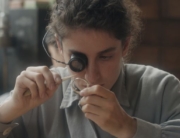
Agnes Kittelsen & Henrik Rafaelsen (Magnolia Pictures)
Directed by Anne Sewitsky
Produced by Synnove Horsdal
Written by Ragnhild Tronvoll
Released by Magnolia Pictures
Norwegian with English subtitles
Norway. 88 min. Rated R
With Agnes Kittelsen, Joachim Rafaelsen, Maibritt Saerens, Henrik Rafaelsen, Oskar Hernaes Bradso & Ram Shihab Ebedy
The title of Norwegian filmmaker Anne Sewitsky’s debut deliberately sounds like an over-eager pep talk, or possibly a bitter rebuke, as in “I’m so happy you’re happy,” to borrow a putdown from All About Eve. Despite the best of efforts by the film’s 30-something quartet, a droll tone, mixed with melancholy, seeps into the after-dinner games and bedroom romps. Sure, there’s heavy drinking, resentment, repressed emotions, but a warm ray of hope—in the person of one neglected spouse—thaws the Scandinavian frostiness.
At first, the film seems like a retread of Junebug, where Amy Adams, in her career-catapulting role, played a small-town Southerner neglected by her husband, and, craving attention, is drawn to the prospect of having a new friend, her sister-in-law. That almost perfectly applies to Kaja, who’s so excited about the arrival of her next door neighbors that she has gone on a yogurt diet to look her best. Gullible but guileless, her neediness is transparent. She’s impulsive, but even when she’s at her most self-centered, she means no malice, like when she asks the new-to-the-sticks Elisabeth (Maibritt Saerens) and Sigve (Henrik Rafaelsen) if they named their adopted son, who is black, Noa becomes it sounds African.(Ah, no, Elisabeth quietly and firmly replies; they just liked the name.) Since Kaja and her husband, Eirik (Joachim Rafaelsen), have a towhead son the same age as Noa, the boys are going to become playmates, whether they like it or not; there are no other families in this neck of the snow-covered woods.
Elisabeth, a polite brittle, beautiful blond, is also a lawyer—the combination of which make Kaja swoon, and immediately Kaja invites the couple for dinner that night for roasted moose, shot by Eirik himself, who, for the most part, remains taciturn, and when he speaks, he’s out of sync with the conversation. No matter hard you try, it’s hard to figure out what Kaja has ever seen in Eirik. Actress Agnes Kittelsen exerts so much energy and is so expressively reactive that she overpowers everyone else, in charisma and in winning the audience’s empathy, and thanks to Kaja’s fragility and optimism, the film’s tone avoids glibness.
Right when you think you have foreseen the trajectory of the foursome, the script abruptly swerves in one direction, keeping you off your guard. (Kaja and Eirik haven’t had sex in over a year; and the other couple moved out of Oslo into the countryside to repair their relationship after Elisabeth’s affair.) While the dialogue is verbose—especially Kaja’s, who shares too much information too soon to her new friends—the plot’s outline is oblique. The lean script cuts right to the heart of the matter(s). Where many films would draw out a scene, revelation by revelation, Happy, Happy has already moved on to the next complication. In fact, the 85-minute film would be a tad shorter if it weren’t for the distracting musical interludes of four white guys singing American spirituals a cappella to the camera. Their cheeriness will wear you out long before Kaja has a chance.
On a discomforting level, the film ranks about a seven. The cringe-producing moments of humiliation raise the dramedy above the familiar roads to self-perception—sometimes horrifyingly so. Out of earshot of the parents, the young boys first become acquainted with each other by playing master and slave. Guess who plays whom? Their scenes nearly come out of another movie all together and almost overwhelm this one. And unlike the adults’ conundrums, this fuzzy storyline really has no resolution. Though everyone has a secret, some are darker, and more developed, than others.






Leave A Comment